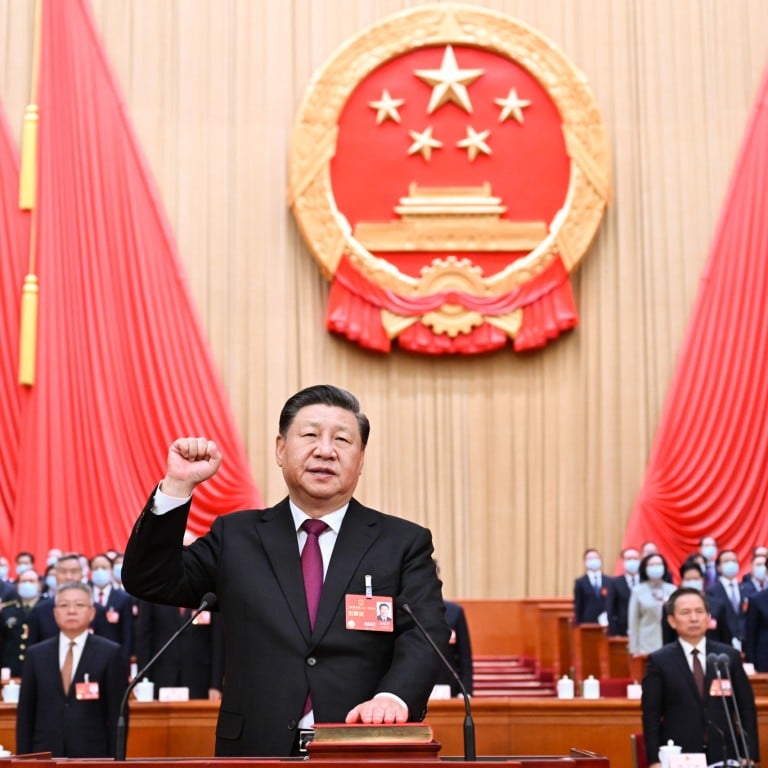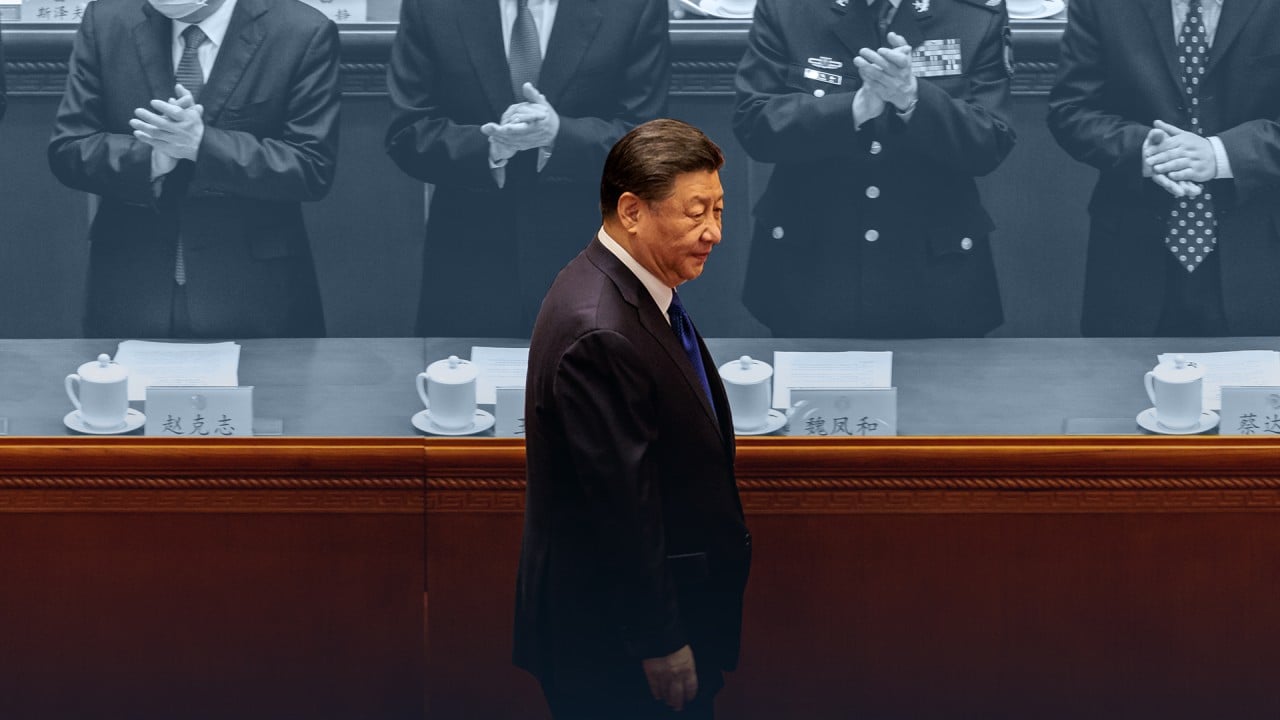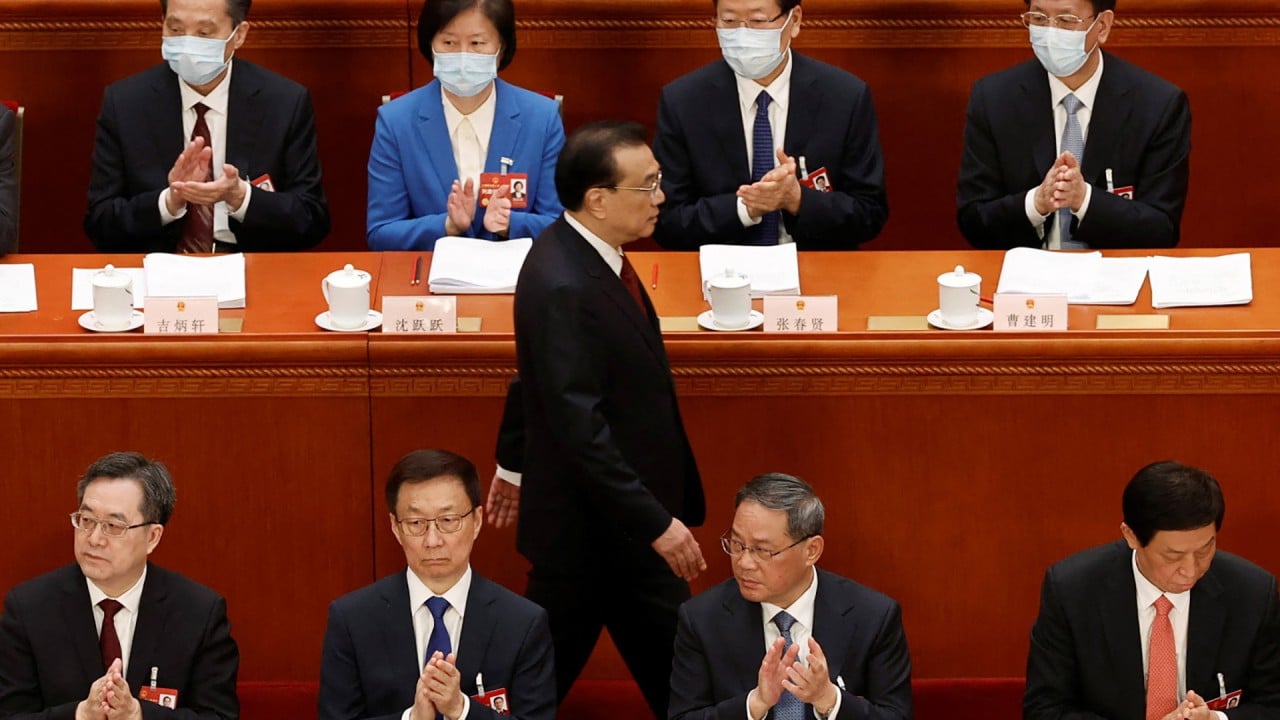
Xi Jinping starts third term as China’s president with unanimous support
- Unprecedented third term approved by the national legislature on Friday
- Reviving economy, Taiwan and rivalry with US among challenges in next five years
Xi will head a hand-picked Communist Party and government team tasked with steering the world’s second-largest economy through challenges at home and abroad over the next five years.
All 2,952 NPC members who attended Friday’s meeting voted for the president. In all, the legislative body has a membership of 2,977.
Analysts say it will be a critical period for both Xi and China as he needs to put the country back on an economic growth path to convince the world that China’s unique governance and development model works.
Xi’s allies will be appointed to key government roles in the remaining two days of the annual legislative session.
As was the case five years ago – when Xi’s previous term was also approved unanimously – the vote by the largely ceremonial legislature was more of a political gesture showing the Chinese political elite’s unequivocal loyalty and deference.
The display gives Xi a strong mandate for the next five years as the country’s most powerful leader in decades.
After the voting, Xi took a constitutional oath, as both the country’s president and head of its military – a symbolic move to show the significance of the constitution after it was revised five years ago to scrap the presidential term limit, include Xi’s political theory and emphasise the party’s leadership of China.
Holding up his right fist in a standard oath-taking gesture for party members, Xi said he would be loyal and uphold the authority of China’s constitution, perform his statutory duties honestly and work hard to build a “prosperous, democratic, civilised, and harmonious socialist country”.
Xi first became Chinese president in 2013 and has not said how many additional five-year terms he intends to serve.
Russian President Vladimir Putin offered “sincere congratulations” to Xi on his third term, one of the first foreign leaders to do so, while Hong Kong Chief Executive John Lee Ka-chiu extended “warmest congratulations”.
Zhao Leji, third-ranking member of the Politburo Standing Committee, was unanimously elected chairman of the NPC Standing Committee, while Politburo member Li Hongzhong was elected as the NPC’s first-ranking deputy chairman.
Zhao, Han, Li and 13 other NPC deputy chairs took their constitutional oaths after Xi.
Peng Qinghua, 65, the former boss of Beijing’s liaison office in Hong Kong, was also appointed as one of the NPC’s deputy chairmen, becoming the first top mainland envoy in the city to become a state leader since Hong Kong’s handover in 1997.
Peng will be joined by former Hunan party boss Zhang Qingwei, 61; and former state councillor and State Council secretary general Xiao Jie, 65.
Former regional chairmen of Tibet Losang Jamcan, 65 and Xinjiang Shohrat Zakir, 69, were the only two members of ethnic minorities in the new NPC Standing Committee, while former chairwoman of the China Federation of Literary and Art Circles Tie Ning, 65, became the only woman among NPC deputy chairs.
‘He has room to do something great’: what to expect from China’s next premier
At the Chinese People’s Political Consultative Conference (CPPCC) meeting, Wang Huning, fourth-ranking member of the Politburo Standing Committee, was elected chairman of the top political advisory body.
Former Hong Kong and Macau chief executives, Leung Chun-ying and Edmund Ho Hau-wah, were elected as CPPCC vice-chairmen.
Other prominent Chinese politicians elected CPPCC deputy chairs include Politburo member and United Front Work Department chief Shi Taifeng, former Politburo member and vice-premier Hu Chunhua and former NPC vice-chairwoman Shen Yueyue.
Long-time Xi aides Li Qiang and Ding Xuexiang, the second- and sixth-ranking members of the Politburo Standing Committee, are expected to be appointed as China’s new premier and executive vice-premier on Saturday and Sunday respectively.
On Saturday, the NPC will also decide on the director of the National Supervisory Commission, president of the Supreme People’s Court and procurator-general of the Supreme People’s Procuratorate.
Other Xi loyalists expected to take on vice-premier roles on Sunday include He Lifeng, Liu Guozhong and Zhang Guoqing.
The leading candidates for state councillors to be determined on Sunday include former Jiangsu and Guizhou provincial party chiefs Wu Zhenglong and Shen Yiqin, new Foreign Minister Qin Gang and Central Military Commission member Li Shangfu, who is likely to be the next defence minister. Wu is also widely seen as a top candidate for secretary general of the State Council, or China’s cabinet.
Chinese Foreign Minister Qin Gang tells US to ‘hit the brakes’
Alfred Wu, an associate professor at the National University of Singapore’s Lee Kuan Yew School of Public Policy, said it was time for Xi to deliver.
“He has consolidated so much power and now put in place a new team made up of his trusted men,” he said. “Going forward, his team will be the one that is accountable.”
Wu said reviving China’s stalled economy, blazing a new path for technological self-reliance, preparing for heightened tensions in the Taiwan Strait and tightening the wires on China’s national security fences would be the top priorities for Xi’s third term.
“Xi himself has warned many times that China will sail on a stormy sea in the coming years, so he will certainly plug the holes on the ship by tightening internal security and instilling strict discipline among his first mate, second mate and sailors, ensuring the economic engine continues to power the ship forward while finding new technologies and other ways to make the ship stronger in case it needs to go into battle,” Wu said.
He said the biggest challenge for Xi remained the tension between China and the US.
“If the situation in the Taiwan Strait is not handled properly, it might disrupt Xi’s goal of a great rejuvenation of China, which is a key legacy for him,” Wu said.
Professor Xie Maosong, a senior researcher at the National Institute of Strategic Studies at Tsinghua University, said the coming five years would be “very critical” for Xi and his team as they needed to arrest China’s economic decline and put it back on a growth path, while delivering on technological self-reliance goals, so that China could convince the world that its development model worked and that it would eventually overtake the United States.
“Some have speculated that China’s economy will never catch up with the US given the slow growth during the Covid years,” he said. “That might be a premature conclusion. We will have a better sense of China’s recovery towards the end of the year.”
Former US Treasury secretary Lawrence Summers said last year that China’s ageing population and Beijing’s increasing tendency to intervene in corporate affairs had led him to substantially lower his expectations for China’s economic growth and he saw parallels between forecasts of China’s rise and earlier prognostications that Japan or Russia would overtake the US – predictions that now looked ridiculous.
But Xie said all China’s top provincial and ministerial leaders were now in pro-growth mode.
“They should have received direct orders by now,” he said.
“The focus this year is nothing else but restarting the economic engine, despite the hostile and unfavourable external environment. Although the growth target is set at a moderate 5 per cent, the 12 million new urban jobs creation target seems to indicate that Beijing is confident it can achieve more than 5 per cent growth.”
Deng Yuwen, a former deputy editor of Study Times, the Central Party School’s official newspaper, said China would never regain its previously stratospheric economic growth rate because Beijing’s hesitation on adjustments to population control policies had caused the country’s demographic dividend to be exhausted prematurely, and favouritism towards state-owned companies at the expense of the private sector had caused the most enterprising Chinese people to lose heart.
“Xi and party officials have made speeches about private companies as ‘our own people’ recently, but the private sector is still sceptical,” he said. “The persuasion requires more effort.”
China’s debt-saddled local governments underscore its moderate GDP target
The NPC also approved a plan to reform the institutions of the State Council, which includes creation of a science and technology commission to better coordinate efforts to tackle China’s hi-tech bottlenecks.
A top financial watchdog will also be established to manage China’s financial risks and a bureau to oversee big data initiatives, as part of a major “party and state institution reform plan” announced during the party’s second plenum earlier this month.
Xi has made repeated calls for reduced dependence on foreign technology as the US has imposed a growing number of export controls, hitting many Chinese firms and industries.
Xie said the change was ordered because Xi was “not satisfied” with the progress of China’s quest for science and technology self-reliance in recent years and “he wants the ministries to crack the hard nuts, not just scratch the surface”.
But the party has remained tight-lipped about its overall reshuffle plan, despite rumours it is considering the further consolidation of its security apparatus.
“The party’s institutional reform will be a key area to watch as it will tell us more about Xi’s coming priorities,” Wu said.



